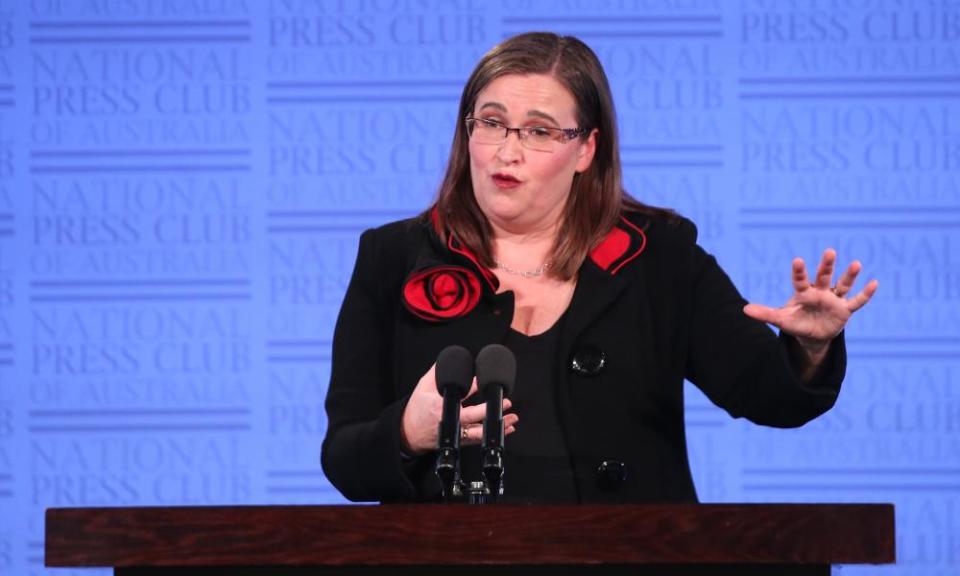Sex discrimination commissioner says Australia at 'turning point' on sexual harassment and assault

Australia’s sex discrimination commissioner Kate Jenkins says she believes Australia is now “at a turning point” in the public conversation about sexual harassment and assault, emphasising the need for “victim-centric” approaches and responses.
Jenkins has been appointed by the Morrison government to lead a review into workplace culture in parliament, a review triggered by the rape allegation levelled by former government staffer Brittany Higgins against a co-worker.
The sex discrimination commissioner told the ABC on Sunday the ground was shifting. “In my time working in this area and particularly looking in workplaces over the 30 years, I’ve never seen any moment like this,” Jenkins said.
Related: Linda Reynolds extends sick leave amid ongoing controversy over Brittany Higgins
She said cultural change was happening “across the board”.
“I think our community is changing, so we’re at a turning point – that is my sense.”
In response to the sustained furore triggered by the Higgins allegation, Jenkins has been asked to consider legislative, cultural, structural or other barriers to reporting incidents in parliamentary workplaces, and also examine the current response and reporting mechanisms in parliamentary workplaces.
Additionally she will consider the operation of the Members of Parliament Staff Act – the legislation under which political staffers are employed – and “assess the extent to which current legislation, policies, processes and practices promote or impede safe and respectful workplaces”.
Higgins initially made a police complaint after the alleged assault in March 2019, but she dropped the action a month later as the government prepared to go to an election. She says she felt that pursuing the complaint would end her career in political staffing.
In a television interview in the middle of February, Higgins said the handling of her complaint by her then employer Linda Reynolds and senior staff, including some in Scott Morrison’s office, made her feel as though she had created a political problem for the government.
“There is a strange culture of silence in the parties and you just don’t … the idea of sort of speaking out on these sorts of issues, especially around [an election] campaign, is just like letting the team down, you are not a team player,” Higgins told Ten.
Jenkins signalled the likely end point of her inquiry – which will report publicly in November – was a new, “more independent” complaints mechanism for parliamentary staff to handle human resources issues.
The sex discrimination commissioner said she was not in a position to say definitively what the outcome of her inquiry would be, but based on comparative work she’d seen internationally, more independence seemed a logical direction to help change the power dynamics in the parliamentary workplace.
Jenkins said it would be important to examine the employment instruments governing parliamentary staff because conditions were out of step with human resources norms that exist in corporations.
“We often hear parliamentarians say [the workplace is] unique and everyone thinks they are unique, but I do think there are some unique things,” Jenkins said.
“One of them is that layer of employment arrangements because it is so unusual who has the power to hire and fire – all of that is slightly different to the average community, so I think that’s relevant.”
Jenkins was asked on Sunday whether there should be mandatory reporting of sexual assault allegations to police. The Australian federal police commissioner, Reece Kershaw, has urged parliamentarians to report any allegations to authorities promptly, “taking into account the rights and privacy of the victim, and irrespective of the jurisdiction in which the alleged conduct has occurred”.
In a recent letter to parliamentarians, Kershaw said any delay in reporting criminal conduct could “result in the loss of key evidence, continuation of the offending and/or reoffending by the alleged perpetrator” and also had “the very real potential to compromise the rights of victims and other parties to alleged offences”.
Jenkins said approaches needed to be victim-centric. “It should be the individual’s decision,” she said.
But she said her review would examine the issues. Jenkins said reporting “shouldn’t be taken out of the hands of the victim, but, again, I do think our inquiry will look particularly at that question because I think it is a really wicked problem for those ministers as to what they should do”.
She said her review would take submissions from interested parties, which could be confidential. She said complaints of harassment raised during the process would not be examined “to find a justice outcome” but to consider what systemic changes would be necessary to improve the workplace environment.
• In Australia, the crisis support service Lifeline is 13 11 14. If you or someone you know is impacted by sexual assault, family or domestic violence, call 1800RESPECT on 1800 737 732 or visit www.1800RESPECT.org.au. In an emergency, call 000. International helplines can be found via www.befrienders.org

 Yahoo Finance
Yahoo Finance 